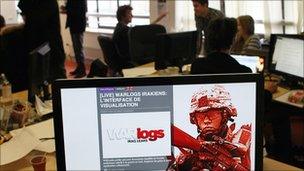Wikileaks: US warns allies on potential diplomatic leak
- Published

The US has briefed a number of foreign governments, including the UK, about the possible release of diplomatic files by whistleblower site Wikileaks.
Reports say Turkey, Israel, Denmark and Norway have also been warned to expect potential embarrassment from the leaks.
The top US military commander Adm Mike Mullen said the release of diplomatic cables was "extremely dangerous" and could put lives at risk.
Wikileaks has said the US authorities are afraid of being held to account.
It has not confirmed exactly when the documents will be made public.
The website, founded by Julian Assange, said earlier this week that the release would be nearly seven times larger than the nearly 400,000 Pentagon documents related to the Iraq war it published in October.
Analysts say the US and its allies have the potential to be embarrassed by the publication of candid assessments of foreign governments by its officials.
State department spokesman PJ Crowley warned on Wednesday that the release could weaken trust in the US as a diplomatic partner.
"When this confidence is betrayed and ends up on the front pages of newspapers or lead stories on television or radio, it has an impact," he said.
'Exposing lives'
In an interview with CNN to be broadcast on Sunday but released as a transcript, Adm Mullen said Wikileaks' actions were "extremely dangerous".
"We live in a world where just a little bitty piece of information can be added to a network of information and really open up an understanding that just wasn't there before," he said.
Adm Mullen said the documents would endanger the lives of US troops and individuals working with them, both in Afghanistan and elsewhere.
"I would hope that those who are responsible for this would, at some point in time, think about the responsibility that they have for lives that they're exposing," he said.
A spokesman for UK Prime Minister David Cameron said on Friday: "Obviously, the government has been briefed by US officials, by the US ambassador, as to the likely content of these leaks.
"I don't want to speculate about precisely what is going to be leaked before it is leaked."
The BBC's Steve Kingstone, in Washington, says the state department is clearly in high gear, contacting embassies around the world.
The media does not yet know precisely what Wikileaks has - in what could be up to three million documents - and it is possible that the state department does not know exactly what the site has either, our correspondent says.
Newspaper reports indicate the release will include papers suggesting that Turkey helped al-Qaeda militants in Iraq, and that the US helped Iraq-based Kurdish separatists who have been engaged in a long conflict with Turkey.
The Russian foreign ministry told Interfax news agency that Moscow had not been officially contacted by the US state department over the possible leak of diplomatic correspondence.
But Russia's Kommersant newspaper said the expected release included discussions between US diplomats and Russian politicians and "unflattering" opinions of some of the latter.
The release is also thought to include cables concerning Israeli-American relations.
'Absolutely awful'
Washington's ambassador to Iraq, James Jeffrey, is quoted by AFP news agency as saying Wikileaks is an "absolutely awful impediment" to US efforts to build trust with other nations.
"I do not understand the motivation for releasing these documents," he told reporters in Baghdad. "They will not help, they will simply hurt our ability to do our work here."
The source of the documents potentially involved in the latest Wikileaks release is not known.
However, US Army Private Bradley Manning, a military analyst who was arrested in June on suspicion of leaking classified data, is currently in custody awaiting trial.
He is alleged to have abused access to a secret-level network to obtain tens of thousands of US state department cables, some of them classified.
- Published24 November 2010
- Published7 December 2010
- Published25 October 2010